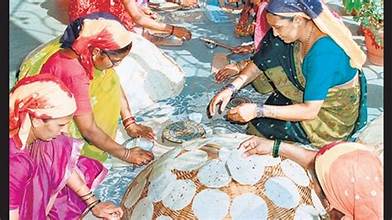
A humble snack has transformed the lives of over 45,000 women across India. The Shri Mahila Griha Udyog Lijjat Papad co-operative, founded in 1959 by seven housewives in Mumbai, has become a symbol of women’s empowerment and entrepreneurial success.
From its modest beginnings with a seed capital of just ₹80, the co-operative now boasts an annual turnover of ₹16 billion ($186 million). Its signature product, Lijjat Papad, is a staple in Indian households and is exported to countries like the UK and the US.
A Unique Model of Empowerment
The Lijjat co-operative is built on the idea of women working from home while managing household responsibilities. Members prepare poppadoms using a pre-mixed dough provided by the organisation, which they roll and dry at home before delivering them for packaging.
“We are not just employees; we are co-owners,” says Swati Paradkar, the co-operative’s president. This unique ownership model ensures equal profit-sharing among members, fostering a sense of community and shared success.
From Humble Beginnings to Global Recognition
The journey of Lijjat Papad began in the 1950s when newly independent India was focusing on rebuilding its economy. Opportunities for women were scarce, and societal norms often restricted them to household duties.
The founders—Jaswantiben Jamnadas Poppat and her six friends—decided to use their cooking skills to earn a living. With initial support from social worker Chhaganlal Karamshi Parekh, the group started making and selling poppadoms.
Despite initial struggles, their perseverance paid off when local shopkeepers began stocking their products. By the 1960s, Lijjat had gained widespread popularity.
A Legacy of Financial Independence
For members like Lakshmi, who joined the co-operative four decades ago after her husband’s death, Lijjat has been life-changing. “I was able to educate my children, build a home, and secure their futures,” she says.
Today, the co-operative produces not just poppadoms but also detergents, spices, and chapatis, all while maintaining its focus on empowering women.
The Secret to Success
Lijjat’s success lies in its principles of equality, respect, and shared responsibility. Members refer to each other as “ben” (sister) in Gujarati, and decisions are made collectively.
The iconic Lijjat brand name, introduced in 1966, further boosted the organisation’s recognition. Suggested by one of its members, the name means “taste” in Gujarati and perfectly encapsulates the essence of their products.
A Continuing Legacy
Lijjat Papad is more than just a snack; it’s a movement that has empowered generations of women to achieve financial independence and respect.
This revolutionary co-operative stands as a testament to the power of collaboration, perseverance, and the entrepreneurial spirit of Indian women.